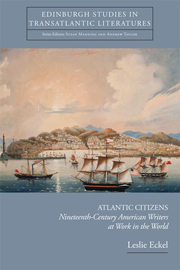Book contents
- Frontmatter
- Contents
- Acknowledgements
- Dedication
- Introduction: The Vocational Routes of American Literature
- 1 Longfellow and the Volume of the World
- 2 Fuller's Conversational Journalism: New York, London, Rome
- 3 ‘A type of his countrymen’: Douglass and Transatlantic Print Culture
- 4 Between Cosmos and Cosmopolis: Emerson's National Criticism
- 5 The Professional Pilgrim: Greenwood Sells the Transatlantic Experience
- 6 Standing Upon America: Whitman and the Profession of National Poetry
- Afterword: Vocation or Vacation? Transatlantic Professionalism Now
- Notes
- Bibliography
- Index
4 - Between Cosmos and Cosmopolis: Emerson's National Criticism
Published online by Cambridge University Press: 05 September 2013
- Frontmatter
- Contents
- Acknowledgements
- Dedication
- Introduction: The Vocational Routes of American Literature
- 1 Longfellow and the Volume of the World
- 2 Fuller's Conversational Journalism: New York, London, Rome
- 3 ‘A type of his countrymen’: Douglass and Transatlantic Print Culture
- 4 Between Cosmos and Cosmopolis: Emerson's National Criticism
- 5 The Professional Pilgrim: Greenwood Sells the Transatlantic Experience
- 6 Standing Upon America: Whitman and the Profession of National Poetry
- Afterword: Vocation or Vacation? Transatlantic Professionalism Now
- Notes
- Bibliography
- Index
Summary
To treat Emerson as Emerson, such is the rarity of the man … would be like treating America, or immensity, or eternity, or any other subject that has practically neither beginning nor end.
C. A. WardFor most of the twentieth century, scholars and reviewers equated Emerson with ‘America’, and treated his writings accordingly as manifestations of an original and national way of thinking about the self and its relation to society. Emerson stands at the confluence of the American past and the present, for he is perceived both as the ‘inventor’ of a modern national tradition in poetry and philosophy and as the inheritor of Puritan perfectionism and early republican pragmatism. Emerson's title of ‘Mr. America’ seems almost infinitely renewable, and the value of his works for definitions of American national identity and character seem perpetually current. Emerson reigns precisely because he allows critics to argue for a uniquely national literary style and philosophical perspective, and unseating him from his position would require the dangerous and potentially impossible task of dismantling a nation's understanding of itself as a distinct cultural entity. Treating Emerson as ‘America’ has its own dangers, however. In 1884, British critic C. A. Ward suggested that Emerson could be taken any number of ways: either as ‘America, or immensity, or eternity, or any other subject’ that an interpreter might propose. In this chapter, I examine the familiar textual instances in which Emerson has been mistaken either for America or as the nation's literary spokesman.
- Type
- Chapter
- Information
- Atlantic CitizensNineteenth-Century American Writers at Work in the World, pp. 99 - 126Publisher: Edinburgh University PressPrint publication year: 2013



